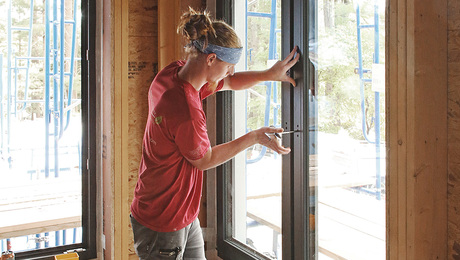*
Hi. My husband is digging deep trenches in our basement. We’ve now exposed enough of the four inch cast iron waste pipe (probably 60 years old minimum)that we can tie in. But, there’s lots of crud on the pipe and Patrick has some concern that the couplers (Fernco) won’t slide very easily onto the cruddy cast iron. Is there a safe and effective lubricant that he could use to make them slide more easily?
And, cutting the pipe is going to be tricky. Is there a simple way to cut through cast iron pipe in a confined space? If you’re responding and you’re a plumbing smarty-pants and you’ve got some great tips to share on filling in those trenches, let me know. Thanks.















Replies
*
Go to the tool rental store, and see if they have a casiron pipe snapper. It's a ratcheting tool with little cutting wheels that you wrap around the pipe and crank down on it. A cutting wheel on a small angle grinder works well too. Maybe a wire wheel in the grinder can clean off the pipe as well. Jeff
*and wear protective as the work is being done. Flying cast iron from a shattered pipe hurts! Jeans, long sleeves,boots, gloves, mask and goggles....I'd even throw on the old hard hat. Jeff
*whatever you fill in the trenches with must not settle or must be compacted.You could use road base and rent a tamper machine. If it settles even a sixteenth of an inch your floor could crack.
*Janine - What weight is the pipe? Usually raised letters, for instance XH = extra heavy. S = service. Etc. The reason for asking is that nearly all of the service (standard) weight below-grade or below-slab cast iron pipe older than 60 years that I've run into needed to bei replaced,not just cut into. The 'crud' might not just be on the outside. This is a job that a pro should look at, IMO, due to the age of the pipe. Time to look at the big picture, and, if repiping is called for, it might save you a lot of work dealing with the old stuff that might not be worth saving.Jeff
*Jannine,You can rent and try a pipe snapper but be prepared for the possibility that the pipe will crush instead of snap. In that case you can go back to the last hub and burn out the lead. Then you can pop in a rubber donut type gasket (Ty-Seal is one brand), lube the spigot end of your new pipe with something called Duck Butter (ask for it in a plumbing supply) and slide it into the hub. If the pipe does snap, clean the outside with a wire wheel or ginder, lube with Duck Butter and you're set. Ckeck local code to see if Fernco's are OK underground, you may have to use a MB or Mission clamp. If it crushes but you don't want to go to the next hub, use a grinder to square off the remains and clean the outside then proceed as above.Fill your trenches with whatever came out, just don't undermine the old pipe and compact well. For any new trenches try to lay the pipe on virgin soil, in other words, don't over dig.Good Luck,Jerry
*It's slow but an abrasive blade on a sawzall will make a neat cut in a small hole.
*Have had no problem with a normal, medium tooth metal cutting blade in a sawzall. Add a little cutting oil to the cut line now and then and the pipe almost cuts like butter, WD-40 works in a pinch. Do appraise the condition of the pipe to see if you have anything worth latching onto. You'll need an experienced eye to evaluate for the long term, I let my plumber do that part.
*Ditto on the Sawzall, a metal blade does nicely.
*
Thanks for the advice - everything went together nicely. One problem, however, is that one joint has a slight leak - I expect as a function of the corrosion on the cast iron. Is there anything I can put on the pipe to plug it up? Will silicone help?
*
Hi. My husband is digging deep trenches in our basement. We've now exposed enough of the four inch cast iron waste pipe (probably 60 years old minimum)that we can tie in. But, there's lots of crud on the pipe and Patrick has some concern that the couplers (Fernco) won't slide very easily onto the cruddy cast iron. Is there a safe and effective lubricant that he could use to make them slide more easily?
And, cutting the pipe is going to be tricky. Is there a simple way to cut through cast iron pipe in a confined space? If you're responding and you're a plumbing smarty-pants and you've got some great tips to share on filling in those trenches, let me know. Thanks.